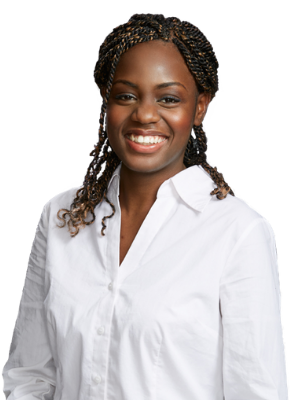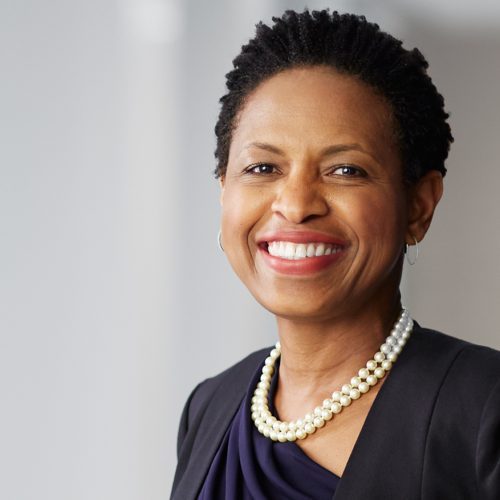 “Because I really have people’s attention, I make sure that my work speaks for itself, that people take me seriously,” says Rose-Gaëlle Belinga from Morgan Stanley.
“Because I really have people’s attention, I make sure that my work speaks for itself, that people take me seriously,” says Rose-Gaëlle Belinga from Morgan Stanley.
Belinga speaks about her unique journey into software engineering and her passion for applying tech acumen to better the world.
The Power of Simple Innovation
Growing up in her family home in Yaoundé, Cameroon, Belinga was inspired towards STEM at an early age by her parents, both family trailblazers who attended university in science fields.
While inclined towards STEM, what piqued her interest in technology was a simple can opener.
When her uncle gifted her book on inventions, she was inspired to learn that the can opener was not invented until 40 years after the can, meaning that people had accepted a harder way to do things.
“Someone said there must be an easier way, and if it doesn’t exist I’m going to go ahead and invent it and everybody is going to benefit from my invention,” says Belinga.
The notion of making a big impact on lives from a simple innovation catalyzed her passion for technological innovation.
Another Kind of Language
After high school, she moved to the U.S. and attained her bachelor and master’s degree in software engineering from Auburn University, alongside a bachelor of arts from Oglethorpe.
But coming from Cameroon, where neither computers nor internet were prevalent at that time, when a professor recommended that she take his Java course, she assumed he was referring to the island in Indonesia.
When that same professor described software through the example of the plane that senses, provides data and course-corrects for the pilot, steering the plane most of the time, she saw that “software was almost the spirit in the machine” and realized tech could complement any field of interest she would have.
As a polyglot, she now counts her programming proficiency among her Bulu, English, French, and German fluency, as well as Latin, Hungarian and Spanish languages she can speak at some level.
“Programming languages also have the grammar and spelling and syntax and all,” she notes.
In 2012, she joined Morgan Stanley after first summer interning there, and loving the company culture, complexity of problems, richness of technology and mobility of opportunities inside the organization.
Leveraging Your Difference
When Belinga moved to an engineering school with 96% caucasian and mainly male student peers, her initial sense of imposter syndrome was offset by being actively supported by her student peers and a Moroccan professor who advised her to leverage her differences.
“My professor told me that when he goes into a classroom, he doesn’t know who the best students are. But when he sees a female student or person of color, they get his attention right away,” she recalls from her junior year. “That’s how my professor challenged me, not to look at being underrepresented as holding me back but as an advantage – and let my work speak for itself.”
Those words stayed with her. When she first began employment, Belinga used her voice to call out those who assumed she was part of the administrative staff rather than the engineering team. But she has never considered her gender nor ethnicity as a barrier to her possibilities.
“Instead, I am showing that the abundance mindset is a thing,” says Belinga. “I’m here for a reason, and everyone I work with knows that. I now get more responsibility than some of my colleagues because I stand out and my team knows I can deliver.”
She mentors to keep your long-term interests in mind when making job decisions – such as advising a friend against moving to a position that was perhaps a diversity quota win for the team but not the best move for him personally, or advising a mentee into a PhD track so she could arrive to her desired focus of tech research.
Technological Philanthropy
“Because I stand out,” she shares, “I try to take advantage of the platform to open the door for others, such as encouraging colleagues to go to under-served high schools to teach computer science or encouraging male colleagues to mentor female students.”
She emphasizes that it can’t just be women helping women or people of color helping people of color, but everyone can step up.
Belinga is animated by technology philanthropy, putting her tech acumen to work for the greater good, not only teaching computer science to students in locally under-served high schools in the New York/New Jersey areas, but also making tech vocations accessible in places where they have been absent.
“One thing that has always made me sad was that I had to leave my support network, my family and everything I knew in order to pursue my studies and seek a better lifestyle,” she reflects. “It would have been nice if those opportunities had been made available locally.”
So Belinga is dedicated to being a part of the change she wants to see. Volunteering in partnership with Global Code and TurnTabl, she has traveled to Ghana with fellow volunteers the last few summers, apart from this past summer.
Partnering with Global Code, they instruct a three to four week crash course which empowers the community students to envision a tech solution project to help the local community – and together they develop the prototype.
For example, due to youth urban migration for education and work, elders did not always have immediate family to call on, let alone an equivalent of 911. The students created a necklace for elderly in the village with an embedded device and three buttons, pre-programmed to make calls or send messages for support in case of falling or emergency.
The best students from the Global Code program can then apply to the Turntabl program to be placed in contract technology jobs (with mentorship) for companies in North America, Europe and Asia from their home country, without having to relocate from their families or support system, as Belinga once did.
Envisioning What is Possible
Catalyzed by her passion for technology philanthropy, one of Belinga’s interests is Augmented Reality and Virtual Reality (AR/VR), which she researches as part of an innovation program that allows employees to dedicate 20% of their time to exploring new solutions or technologies.
“Wouldn’t it be great if with a headset we could allow different people to collaborate in the same virtual room?” she asks, whether an office or in a classroom.
Along with the benefit of collaboration, 3D data visualization animates her. She imagines her nephews being able to explore a village in the rainforest or to hear someone speak her native tongue, Bulu.
She also sees the potential of AR/VR to shift how we think about the issues we need to collectively confront, such as by immersing us in the reality of places most affected by them. Her first contact with the power of AR/VR was standing in middle of Times Square as she experienced it submerged according to sea level rising scenarios.
“AR/VR has the potential to help us see how the actions we take affect other people we don’t see,” she says, “so we can build more emotional intelligence and motivate ourselves to tackle it together.”
Belinga is an active member of the FIRE movement. For her, it represents finding life hacks to make your biggest dreams (if health, wealth and time were no issue) happen in the here and now.
She is currently polishing up Pachelbel’s “Canon in D” on the violin to fulfill her brother’s wish for a public performance (it will be her first) at his wedding this summer.
By Aimee Hansen


